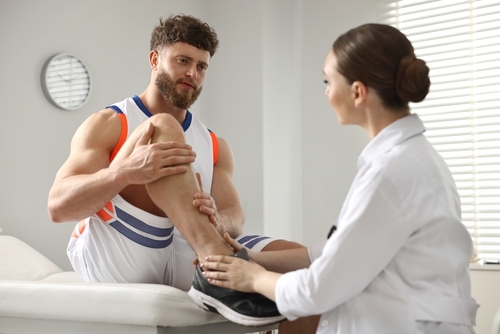Physical Clearance Isn't the Only Thing Athletes Need to Return to Play

Key points
The fear of re-injury is the leading reason for failure to return to competitive sports.
There are many screening tools used to assess an athlete’s psychological readiness to return to play.
Teams should have policies and procedures to monitor a player’s psychological readiness to return to play.
When an athlete gets injured, whether it be a short-term or long-term rehabilitation and recovery, many new issues and stressors arise. The psychological factors play a key role in the length of time to recovery. Supporting both physical and psychological recovery in injured athletes is crucial, as research demonstrates that personality traits, fear of re-injury, and loss of interest all affect an athlete’s ability to return to play successfully1. The fear of re-injury is the leading reason for failure to return to competitive sport2. It has been established that return to play cannot be predicted by objective physical improvement post-surgery alone3, so why are teams still considering physical benchmarks to determine when a player can return to their sport?
Oftentimes, the health and performance staff, in conjunction with the sports medicine physician and orthopedic surgeon, determine when a player is “cleared” to come back into the game. Given all the research that’s now available supporting that assessing psychological readiness is imperative to successful return to play, why has it not been implemented?
What does it mean to be “psychologically ready” to return to sport? It’s been suggested that psychological readiness to return to sport is composed of three key aspects4.
Confidence in returning to sport
Realistic expectations of sporting capability
Motivation to regain pre-injury performance standards
Several individual risk factors contribute to developing mental health symptoms following serious injury, including perfectionism, impatience, impulsivity, history of neglect/abuse, poor body image, low self-esteem, risk-taking behaviors, limited coping skills, anxiety/worry, insomnia, low mood, and other life stressors. It is critical to have a good social support system during recovery to mitigate the social pressures and organizational stress that an athlete may face.
One may next wonder how this can be assessed and how progress can be monitored over time. There are many screening tools used to assess an athlete’s psychological readiness to return to play, including:
Injury-Psychological Readiness to Return to Sport (I-PRRS)
Psychological Readiness of Injured Athlete to Return to Sport (PRIA-RS)
Anterior Cruciate Ligament Return to Sport After Injury Scale (ACL-RSI)
Pain Catastrophizing Scale (PCS) and Pain Self-Efficacy Questionnaire (PSEQ)
Tampa Scale for Kinesiophobia-11 (TSK-11)
Through the use of the above scales, an athlete can be regularly monitored for progress, just like they would by the sports medicine team in regards to the physical aspects of their injury.
It is of the utmost importance that teams implement policies and procedures that, through integration of the team’s mental health clinician, can monitor and assess a player’s progress as they approach physical clearance to return to play. The American Board of Sports and Performance Psychiatry has begun to create practice guidelines to standardize recommendations in the field.
References
Chen AZ, Greaves KM, Fortney TA, Saltzman BM, Trofa DP, Ahmad CS. Psychological Factors Associated With Return to Play After Ulnar Collateral Ligament Reconstruction: A Systematic Review. Orthop J Sports Med. 2022 Oct 7;10(10):23259671221125746. doi: 10.1177/23259671221125746. PMID: 36225388; PMCID: PMC9549101.
Andrew J. Sheean, James H. Lubowitz, Jefferson C. Brand, Michael J. Rossi, Psychological Readiness to Return to Sport: Fear of Reinjury Is the Leading Reason for Failure to Return to Competitive Sport and Is Modifiable, Arthroscopy: The Journal of Arthroscopic & Related Surgery, Volume 39, Issue 8, 2023, Pages 1775-1778, ISSN 0749-8063.
Lentz TA, Zeppieri G Jr, George SZ, Tillman SM, Moser MW, Farmer KW, Chmielewski TL. Comparison of physical impairment, functional, and psychosocial measures based on fear of reinjury/lack of confidence and return-to-sport status after ACL reconstruction. Am J Sports Med. 2015 Feb;43(2):345-53. doi: 10.1177/0363546514559707. Epub 2014 Dec 5. PMID: 25480833.
Webster KE, Nagelli CV, Hewett TE, Feller JA. Factors Associated With Psychological Readiness to Return to Sport After Anterior Cruciate Ligament Reconstruction Surgery. Am J Sports Med. 2018 Jun;46(7):1545-1550. doi: 10.1177/0363546518773757. Epub 2018 May 2. PMID: 29718684; PMCID: PMC6598700.







